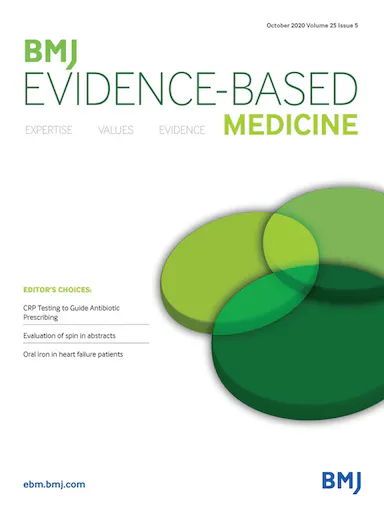Antimicrobial Resistance
How to submit an article:
- Registered users can submit any published journal article that has a unique DOI (Digital Object Identifier) name or link to Research Hub.
- For example, you can paste the full DOI link:
https://doi.org/10.1109/5.771073or just the DOI name:10.1109/5.771073into the field above and click submit. - The person who is first to submit a valid article to Research Hub will forever be credited for it, and every article submission earns you +6 Research Points.
Related Topics
Published research studies are articles that present the findings of original research that has undergone a peer-review process and has been made publicly available in scholarly journals, books or other media.
Research insights are moderated by the Research Hub team and offer an at-a-glance overview of interesting research findings.

2020 BMJ Evidence-Based Medicine
Honey can be used as an alternative to antibiotics by clinicians who wish to offer treatment for upper respiratory tract infections, which may help to combat antimicrobial resistance.
Systematic Review Antimicrobial Cough Honey URTI
Effectiveness of honey for symptomatic relief in upper respiratory tract infections: a systematic review and meta-analysis
Abuelgasim H, Albury C, Lee J

2020 BMJ Evidence-Based Medicine
Honey is more effective than usual care alternatives for improving upper respiratory tract infection symptoms, particularly cough frequency and cough severity.
Systematic Review Antimicrobial Cough Honey URTI
Effectiveness of honey for symptomatic relief in upper respiratory tract infections: a systematic review and meta-analysis
Abuelgasim H, Albury C, Lee J
Review Articles
Review articles summarise and critically evaluate the current state of research on a specific topic or field by synthesising multiple primary research studies.
Clinical Trials
Clinical trials are research studies that involve people and are conducted to evaluate the safety and efficacy of new treatments or interventions, such as drugs, medical devices, or behavioural therapies.
Study Protocols
Published study protocols are detailed plans that outline the objectives, methodology, statistical analyses, and organisation of a research study that have been made publicly available for others to review and use as a reference.
Presentation Slides

Systematic Review
Honey can be used as an alternative to antibiotics by clinicians who wish to offer treatment for upper respiratory tract infections, which may help to combat antimicrobial resistance.
Abuelgasim H, Albury C, Lee J

Systematic Review
Honey is more effective than usual care alternatives for improving upper respiratory tract infection symptoms, particularly cough frequency and cough severity.
Abuelgasim H, Albury C, Lee J
Executive Summary
Write an executive summary in the form of a blog article on the topic of "Research into Chinese medicine treatment for Antimicrobial Resistance" summarising the research below and using language that can be easily understood by patients and avoiding medical jargon using a professional and caring tone of voice.
Write an executive summary in the form of a blog article on the topic of "Researched Chinese medicine treatments for Antimicrobial Resistance" summarising the research below in an objective and easy to understand way, and using language that can be easily understood by patients. Group the article into Chinese medicine treatments first, followed by nutrition and other treatments. Avoid using medical jargon and use a professional and caring tone of voice.
Write me a concise but easy to understand executive summary on the topic of "Chinese medicine treatments for Antimicrobial Resistance" based on the following research that I will give you. Your summary should be 2 paragraphs long in Australian English spelling and include references to the studies.
A Systematic Review published in 2020 in the journal BMJ Evidence-Based Medicine found that Honey can be used as an alternative to antibiotics by clinicians who wish to offer treatment for upper respiratory tract infections, which may help to combat antimicrobial resistance. Upper respiratory tract infections (URTIs) are the most frequent reason for antibiotic prescription. Since the majority of URTIs are viral, antibiotic prescription is both ineffective and inappropriate. However, a lack of effective alternatives, as well as a desire to preserve the patient–doctor relationship, both contribute to antibiotic over prescription. Antibiotic overuse is a key driver of antimicrobial resistance, rated by the UK government as one of the top 10 risks facing Britain. Furthermore, drug resistant infections are associated with worse patient outcomes than antibiotic susceptible infections, underlining the impact of antimicrobial resistance on individual patients.
A Systematic Review published in 2020 in the journal BMJ Evidence-Based Medicine found that Honey is more effective than usual care alternatives for improving upper respiratory tract infection symptoms, particularly cough frequency and cough severity. We identified 1345 unique records, and 14 studies were included. Overall risk of bias was moderate. Compared with usual care, honey improved combined symptom score, cough frequency. We combined two studies comparing honey with placebo for relieving combined symptoms. Honey was superior to usual care for the improvement of symptoms of upper respiratory tract infections. It provides a widely available and cheap alternative to antibiotics. Honey could help efforts to slow the spread of antimicrobial resistance, but further high quality, placebo controlled trials are needed.
Moderation Tools
Topic
Sign In
Users not signed in are limited to viewing the 5 most recent items of content.